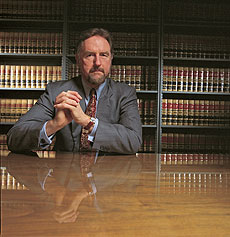A recent landmark ruling by a three-judge panel ordering the State of California to drastically reduce its prison population cited analysis and trial testimony by psychology professor Craig Haney.
The decision by the Ninth Circuit, issued August 4, orders the reduction to provide constitutionally mandated levels of health and mental health care. The decision followed a tentative ruling in February and preceded the August 11 riot at Chino State Prison, which Haney described as "one of the worst, most overcrowded facilities in the system."
In the written decision, the judges agreed with Haney that overcrowding could be isolated as the "primary cause of the continuing constitutional violations that plague the California prison system." The judges further embraced his conclusion that "the only remedy for the ongoing Eighth Amendment violations in the delivery of mental health and medical care is a substantial reduction of the CDCR inmate population."
They endorsed Haney's recommendation that the population be reduced to between 130 percent and 145 percent of design capacity, at a minimum, if "medical and mental health services are ever to attain constitutional compliance."
The judges also cited Haney's expertise, which includes 35 years of research on the psychological effects of living and working in institutional environments. Haney has "toured, inspected, and analyzed conditions of confinement in prisons in twenty states, three maximum security federal prisons, and prisons in five other countries," they wrote.
The judges quoted Haney's description of the "reception centers" in the California prison system--like the one at Chino--as "toxic, noxious, [and] psychologically and medically unhealthy" places.
Haney and other experts testified at the trial that the abysmal state of California prisons, brought about primarily by the unprecedented and unheard of levels of overcrowding from which the entire prison system suffered, was actually "criminogenic"--that is, it tended to increase the propensity of prisoners to commit crimes once released and therefore posed a serious and continuing threat to public safety if not resolved.
The judges gave state officials two years to address the problems.



